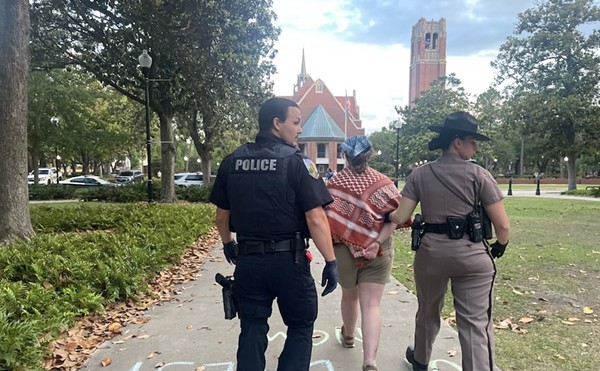The Rev. John Butler Book's two-story Cracker house in Maitland, built in 1876, is one of the oldest homes in Orange County. Inside, it feels like a museum -- look but don't touch. Blankets cover the chairs, and old-fashioned clocks hang on the walls. I'm sitting in the dining room listening to Book, and the table wobbles and rattles as I take notes.
Book is dressed in a shirt and tie. He keeps a thick, heavily notated King James Bible by his side. Rupert Murdoch (of Fox-TV fame) owns the publishing rights to the more colloquial New International Version of the Bible, so Book won't touch it.
Frankly, I was a bit surprised he agreed to this interview. And he's a bit surprised that I wanted to interview him. Book is a right-wing social activist, and to my knowledge this paper has never written anything remotely flattering about him.
Book is prominent in fundamentalist circles, a former pastor of a nondenominational congregation who now hosts a Sunday morning show, "Christian Viewpoint," on Bright House Cable Channel 98, which is syndicated nationally to 400 outlets and reaches, by his own estimate, as many as 15 million viewers. He's helped found 16 Christian schools, including A Book's Christian Academy in Apopka and Northside Christian School in Maitland. He spends four to five months a year as a traveling evangelist, going into dozens of congregations for revivals and to raise money for his TV show.
I'm here to talk to him about the end of the world which, depending on who you believe, is nigh. Or it isn't. War in Iraq portends the second coming of Christ. Or it doesn't. Regardless of the exact schedule, these are boom times for eschatology. Everybody seems to have a prediction about when the world will end, and whether or not the Bible's predictions about the end are coming to fruition. Everybody including Book.
First, though, he wants to know about my soul, so I take him through the story: Twelve years of parochial school which I ultimately found self-righteous and out-of-touch (I had a teacher suggest the Salem witch trials were justified); no big fan of the social and political whims of conservative churches.
It turns out Book had a similar experience when he went to Bible college in Cincinnati. A son and grandson of preachers, he followed suit, but found his peers overly self-righteous and buying into "feel-good, commercialized" religion. "I decided I would try to capitalize on the weaknesses in what was offered as Christianity," he says.
In his case, that meant countless protests against gay rights, "The Last Temptation of Christ," abortion, rap music, the Equal Rights Amendment, school busing, sex education, gun control, pornography, Sunday liquor sales, any voucher program that restricts what private schools can teach with taxpayer money, even antiwar movements. When three years ago Orange County debated rave laws, Book suggested that if child-abuse laws were relaxed and parents could more effectively spank, kids would better behave and these problems could be avoided. In 1972 and 1993, Book used the Florida Legislature's invocation to rail against liberals, necrophilia, gay adoptions and death-penalty opponents.
Often he's a coalition of one, standing alone outside an adult entertainment club or blocking an antiwar protest's buses with his van, as he did in 1991.
When Book waxes political, as he invariably does, he sounds more than a little like Pat Buchanan. He spends the majority of our two-hour talk off topic, ranting about the United Nations, immigration, giving aid to non-Christian nations (including Israel) and the Supreme Court's decision to ban prayer in schools. He blames the latter, in fact, for most of society's woes.
"The great falling away is here," Book says. "Immorality prevails. The church has turned its back `on such issues` as divorce and remarriage. God will not spare any nation that openly rebels against his statutes. When the world rejects these truths" -- he holds up his Bible -- "this book will conquer `the world`."
And perhaps soon. Book's view of eschatology, or end-times theology, is more dire than the one popularized by the best-selling "Left Behind" books, and taught by Southern Baptists and other evangelical churches. The popular view holds that Christ will return to take Christians to heaven (the "Rapture"), leaving the rest of the world to suffer through the seven-year Tribulation and be ruled by the dictatorial antichrist's one-world government. In this version, sinners at least get one last chance to repent before being cast into hell.
No such luck, says Book. There will be no Rapture, and the term "antichrist" isn't literal. Book sees a nuclear holocaust, followed by Christ's return. Thereafter, most of humanity is cast into hell; only a few real believers get to see heaven. (How few? Book compares the number to the story of Noah's Ark, in which God destroyed the whole world except for eight member of Noah's family. In other words, many who think they'll make the cut won't.)
One possible scenario Book sees: Iraq uses chemical weapons on American troops, America goes nuclear, leveling Iraq and ratcheting up Muslim hatred of America throughout the world. Soon enough, "suitcase nukes" go off in U.S. cities, prompting U.S retaliation; civilization as we know it fissiles into a hydrogen-fueled mess, paving the way for Christ's return.
But no matter if the end comes via Iraq, North Korea, terrorists or some yet-unforeseen calamity, Book says the world can't avoid its nuclear reckoning, and consequently, the Lord's return. "I think it's imminent," Book says. "I don't think we can escape it."
That's the read from one of our staunchest homegrown fundamentalists. But within Christian circles, there's no agreement on exactly what the Book of Revelations actually predicts. Interpreting the figurative language of prophetic scripture is tricky business, given the propensity of the Biblical writers to describe bowls, vials, seals, a beast with 10 heads, demonic horsemen, the Whore of Babylon and so forth.
Liberal Christian scholars (and some conservatives, including Book) read the Book of Revelations figuratively, theorizing that its prophecies pertained only to Christians in first-century Rome. And evangelicals -- who make up 20 to 25 percent of Americans -- disagree on the timing and existence of the Rapture.
Southern Baptists have their own version of the end times, which I know well from my years in fundamentalist parochial school. Thanks largely to the "Left Behind" series, it's also the version that is enjoying a good deal of popular appeal at the moment, and it goes something like this:
Leading up to the Rapture, wars and natural disasters become increasingly frequent. The world's only bright spot is Israel, which has a booming economy (reason unknown) and has seemingly made peace with its Arab neighbors. But jealous Russia, with Arab backers, mounts a stealth attack that only the intervention of God puts down.
Then comes the Rapture, the bodily ascendance of millions of Christians and small children, leaving the world in chaos, out of which the antichrist emerges as a man of peace. He convinces world leaders to disarm and consolidate into a one-world government, and signs a peace treaty with Israel, marking the official start of the seven-year Tribulation.
Not every country's happy about losing their sovereignty, so there's a rebellion. That breeds nuclear war, which kills millions, as do the various judgments that pour from the heavens such as melting ice caps, plagues of locusts and scorpions, and devastating earthquakes.
Three-and-a-half years after the Tribulation begins, the antichrist is assassinated, but comes back to life claiming to be God. He takes control of the world religion, breaks the treaty with Israel, and we enter the Great Tribulation, or the world's last 42 months. The antichrist persecutes Christians -- heretofore he labeled them intolerant bigots -- and requires everyone to show his mark in order to buy food and supplies.
Finally, there's Armageddon, the last battle between good and evil, in which Christ returns, conquers the antichrist and establishes a 1,000 year kingdom on earth. After 1,000 years Satan returns from the pit to challenge Jesus, loses, and Christ establishes a "new heaven and a new earth."
It's the end of the world as we know it.
Don't get fooled again
In the 2,000 years since the time of Christ, his followers have specified hundreds of dates for his return. Of course they were all wrong. Nonetheless, many fundamentalists see a world ripe for a not-too-distant Second Coming.
We've got the "wars and rumors of wars" -- Sept. 11, Iraq, North Korea, Afghanistan, the Palestinian Intifada and a seemingly eternal war on terror -- which are a Biblical prerequisite for the end. The establishment of Israel in 1948 and that country's taking of Jerusalem in 1967 are key elements in the end-times saga. There's the European Union, a step toward a one-world government the antichrist will reign; and the Euro, a veritable one-world currency. We live in a world where ecumenism, or tolerance of world religions, is an increasingly popular ideal, which lays the groundwork for the world religion the antichrist will lead.
Not to mention what many Christians see as the continuing degradation of moral values. The gay-rights movement, the "under God" court decision and attempts by the ACLU and other groups to remove God from public life altogether, profane pop stars and TV shows that appeal to base values, all show a world ripe for God's last judgment.
"It looks like our world is spiraling out of control," says Rocky Purvis, pastor of the 400-member Downtown Baptist Church.
Of course, wars and disease are nothing new. And moral decay has been a rallying cry of evangelists since the Middle Ages.
But in the post-Sept. 11 world, the chorus appears to be growing. A Time Magazine poll last year stated 59 percent of Americans think Revelation's prophecies are literal and will occur. Thirty-three percent watch current events in light of Biblical prophecy. Seventeen percent believe the world will end during their lifetime.
Banking on it
The 11 "Left Behind" books -- the latest, Armageddon, was released this week -- aren't the first Apocalyptic literature to sit atop bestseller lists. In 1970, Hal Lindsey's "The Late Great Planet Earth" suggested Christ would return 40 years after Israel came to be. It was the best-selling nonfiction book of that decade.
Similarly "Left Behind" -- a series of novels that tracks the adventures of those who missed the Rapture, became Christians, fought the antichrist and tried to proselytize as much of the world as possible before the end -- has seen remarkable success since it debuted in 1995, selling more than 50 million copies. There have been two movies, "Left Behind: The Movie" and "Left Behind II: Tribulation Force," and plans exist for at least two more movies and three more books (including book 12, a prequel and a sequel).
They're not quite literary masterpieces, but if you ignore the sermonizing and overtly-stereotyped-yet-somehow-unbelievable characters, the series' concept and quick pace make it an interesting read.
Co-author Tim LaHaye (who conceives the ideas for the novels; the other writer, Jerry Jenkins, provides the narrative) is a big shot in evangelical circles. He helped found Jerry Falwell's Moral Majority; his wife Beverly founded the equally right-wing Concerned Women for America. He also recently founded a sort of prophecy school at Falwell's Liberty University.
LaHaye expects the world to end in the not-too-distant future. His "Left Behind" books are all set before 2015.
LaHaye suggests the end of a conflict in Iraq, combined with current talks of establishing a Palestinian state by 2005, could pave to the way to the Tribulation.
"Essentially, the current war `In Iraq` does not have a place in `prophecy`," he says from his California home. "Except for `references to` perilous times in the last days. Also, Babylon and Israel are the focal points of the last days. These two areas of the world are taking center stage. Babylon is beginning to rise in prominence in world thinking."
In LaHaye's teaching, the ancient city of Babylon (about 100 kilometers south of present-day Baghdad) is rebuilt and becomes the center of world government, religion and commerce.
LaHaye continues: "Suppose after Saddam Hussein is eliminated, and U.N. protection is given to Iraq, the natural thing for the U.N. is that New York isn't a savvy place for the headquarters of the one-world government."
Meanwhile, renewed peace talks in Israel might lessen the Arab world's hatred of the Israeli state. Says LaHaye: "Israel could pursue a statesmanship position. It could set up this time of peace `that precedes the Tribulation`."
The end is nighish
History hasn't been kind to those who set a timetable for the end. Baptist lay preacher William Miller predicted the world would end March 21, 1843. He later revised his date to Oct. 22, 1844, a day now known as the "Great Disappointment" because many Christians sold their property and quit their jobs to prepare for imminent departure. More recently, televangelist Pat Robertson predicted the world could end by fall, 1982. The Jehovah's Witnesses have predicted the end at least seven times since 1914.
Throughout Christian history, nearly every generation thought theirs was the one. In the Middle Ages, the plague, the passing of the first millennia and even earthquakes ratcheted up apocalyptic fervor.
"Though the predictions failed, the prophecies continued," says C. Marvin Pate, co-author of "Iraq: Babylon of the End Times?" and professor at Ouachita Baptist University in Arkansas. "The regathering of the Jews `in the Holy Land in 1948 seemed to` signal the moment. People began to think certain prophecies were being initiated. They began to read our day back to the Biblical text."
Today's evangelicals don't set exact dates. Instead, while saying they think Christ will return during their lifetime, they also quote Jesus' admonition that no one knows the day or the hour of his return. "I could live a hundred years and have Jesus not come back yet, but that wouldn't change my beliefs," says Purvis. "`But` do I believe it's soon? Yes I do."
Adds LaHaye: "I maintain that we Christians today have more reason to believe than any generation before us. There's nothing `else` that needs to happen before the Rapture."
After the Civil War, evangelist John Darby declared for the first time the Rapture came before the Tribulation, not after -- an idea popular with fundamentalists since. The term "premillenial dispensationalism" was born, and it had drastic implications for how Christians were to view the world.
Darby preached that the world was a "wrecked vessel" and thus, Christians should save "souls, not bodies," writes Washington University religious studies professor Frank Flinn in an essay titled "The Many American Millenialisms." "Hence fundamental premillenialists came to oppose any political action by believer`s` or social reform by the government `such as` the New Deal. `They believed` Satan owns this whole world and `operates` through his special agents: godless Darwinists, the Roman Catholic Church (the 'Whore of Babylon'), Bolshevists and Jewish Bankers. Fundamentalists hankered for the 'good ole time religion' and awaited the avenging angel of the End."
In the same vein, there's no mistaking the themes of the "Left Behind" series. Mostly, its an extension of the religious right's worldview.
"I was concerned about the growing secularization of American values," LaHaye told "Insight on the News" magazine last September. "That's why in 1980 I wrote a book called "Battle for the Mind" about the ongoing cultural war to determine whether this nation's highest values shall be based on secular humanism or on the laws of God and the nature of man. There is a strong, influential minority trying to make American a secular nation."
He names the ACLU and People for the American Way, specifically.
The "Left Behind" books are full of LaHaye's politics: The United Nations is an inept body that leads to the evil one-world government; gun control is bad; the Catholic Church will lead to an evil, one-world religion; world peace is an unobtainable myth; and Israel must be protected at all costs so it can flourish ahead of Christ's return. (Jews still don't make the heavenly cut unless they convert.)
The book's heroes operate like a militia, stockpiling guns and supplies so the government can't track them.
Fear not
John Butler Book is not a big fan of the apocalyptic books. "Hal Lindsey and others who write books about Revelation are capitalizing on the inquisitive nature of the human race to want to know the future," he says. "That's why palm readers make money. Jesus said no man knows. For man to then predict a time is lying."
He does, however, agree with LaHaye's political themes. He despises the ACLU and boasts about carrying a handgun (he's been shot at three times, he says). He thinks the United Nations is evil. And he thinks America has abandoned its godly roots.
Years ago, Book tells me, former U.S. Sen. Strom Thurmond sent him a note describing the Supreme Court as a "nine-man dictatorship" for barring God from public schools. That decision, he says, will lead to the immorality that brings Jesus back. And he'll come back with a (probably nuclear) bang.
"When he comes, there's nothing secret about it," Book says. "Could `this war signal` the Lord's second return? Yes. `But` I don't think it will happen until the falling away is even greater."
He notes that the Bible's "wars and rumors of wars" come before, not at, the end of the world, so if that's what we're seeing on the nightly news, you still have a wait ahead of you.
Meanwhile, barring some revival to "extend the tide of current events," Book thinks the world will get increasingly depraved, while the mainstream church becomes increasingly irrelevant.
But to the few true believers, Book says take heart: "The second return is not something we should be afraid of, we should be looking forward to it. The church ultimately wins."

















